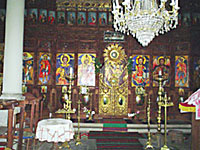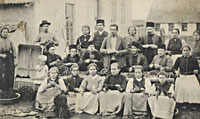|
The territory of Byala
Cherkva still bears the marks of antiquity when Thracian tribes settled here,
attracted by the fertile and beautiful land.
The later
inhabitants of the region - Romans, Slavs, Proto-Bulgarians and Ottoman Turks
- left a heritage of fortresses, settlements, monasteries, antique furnaces
for structural clay products, roads, coins, votive tablets, ornaments and
tools. The Roman road from Nicopolis ad Istrum (the village of Nikyup) to
Melta (Lovech) and Serdica (Sofia) passed through the area.
|

St James' Church
|
The first
settlement - Belinska Byala Cherkva - emerged on the other bank of the
Rositsa River, in the area Selishte. The legend says that its inhabitants
took part in the first uprising against the Ottoman rule - the Tarnovo
Uprising in 1598, after which the Turks burnt down the settlement.
The present Byala Cherkva
was founded on the site of the small village of Mourad Bey,
which was founded by Turkish colonizers in c. 15 to bring an economic
revival to the landed estate, donated to an Ottoman feudal lord. Christians
from the destroyed medieval settlement Belinska Byala Cherkva
and from the neighbouring villages settled here in c. 16 and 17. The
Bulgarians gradually became the largest part of the population. The name Byala Cherkva
was restored after the National
Liberation in 1878.
During the National
Revival period, the village had a spiritual upsurge connected with the struggle for independence of the Bulgarian Church from the Greek
Patriarchate and liberation from the Ottoman rule.
|

The exquisite iconostasis of
St James' Church
|
The inhabitants of Byala Cherkva
built the first church - St James' - in 1832,
building into it pillars from the antique town Nicopolis ad Istrum. A second
church, which still exists, was built in 1866. One of the sources through
which that time's ideas reached the village was a copy of Paissiy's History. The first cell school (a primitive
semi-religious school) in the village was opened in 1835. A new school
building was built in 1858, and the first secondary school in the region was
opened in 1874.
The revolutionary
and cultural worker Bacho Kiro founded in Byala Cherkva
the first village cultural club in Bulgaria
in 1869, and the first travelling
theatrical company in Bulgaria in the following year.
The inhabitants of Byala Cherkva
took active part in the struggles for national liberation. A revolutionary
committee presided by Bacho
Kiro was founded here in 1872 and serious preparation for an uprising
started. 101 rebels under the command of Bacho Kiro went to the
gathering point in the village of Mousina during the April Uprising in 1876,
where a detachment was formed under the command of Priest Hariton, Petar
Parmakov, Hristo Karaminkov and Bacho Kiro. The detachment (of
over 200 people) was defeated after nine days' heroic fighting with the
Turks in Dryanovo Monastery. 75 young men from Byala Cherkva
fell dead among the ruins of the monastery. Bacho
Kiro managed to escape, but was caught later and was brought to trial in an
Ottoman court. He was hanged on 28 May 1876. Three inhabitants of Byala Cherkva
fought in the detachment of another revolutionary leader - Hristo Botev - in
1876.
Byala Cherkva met
liberty on 24 June (old style) 1877. Economic and cultural progress began.
The teacher Nikola Bakev founded a subdivision of the Bulgarian. Social-Democratic
Party in 1895, and Tsanko Tserkovski founded a Youth Educational Society,
which lay the beginning of the organized agrarian political movement in
Bulgaria.
|

Grafting of young vines
|
The main livelihood
of the population is agriculture and vine-growing. The first threshing
machine was brought into Byala Cherkva
as early as 1900, and another 108 followed – as many as in the whole
Northern Bulgaria. A vine-growers' association was set up in 1903, and the
Zashtita (Protection) Credit Cooperative - one of the first in the
country - was established in 1905. The village was supplied with water and
electricity in 1922. There were a mixed secondary school, a pedagogical
institute and a school for carters and smiths here in the twenties of c. 20.
Byala Cherkva was
the birthplace of great Bulgarians - Bacho
Kiro, Tsanko Tserkovski,
Raiko Daskalov, and the eminent Bulgarian historian Prof. Alexander Bourmov.
There is a Monument
to Liberty, with the names of the inhabitants of Byala Cherkva
who fought in the wars written on it,
erected at the centre of the settlement.
Byala Cherkva was
proclaimed a town in 1976 in honour of the 100th anniversary of
the April Uprising. The grateful generations have erected 11 monuments and
put up 94 memorial plaques. 4 museums tell the history of the settlement.
|